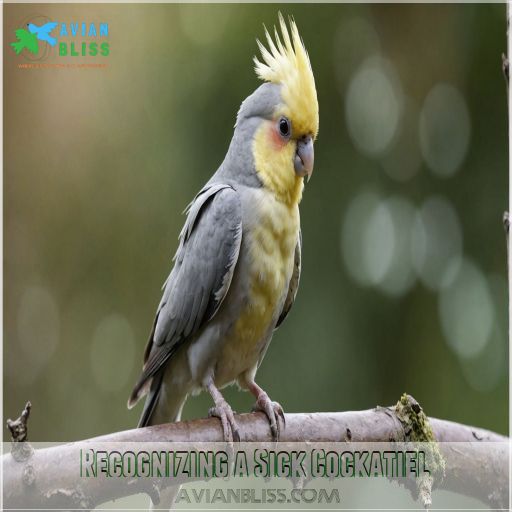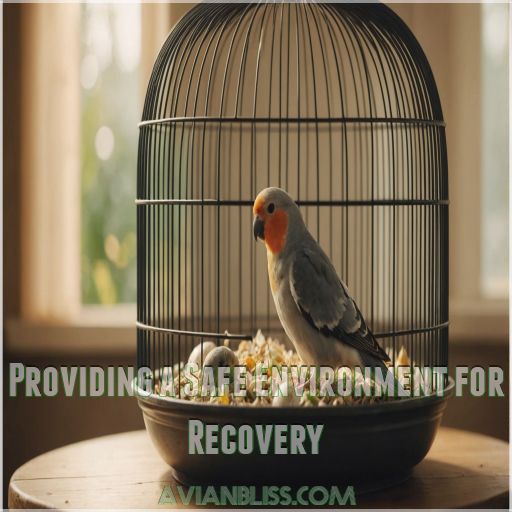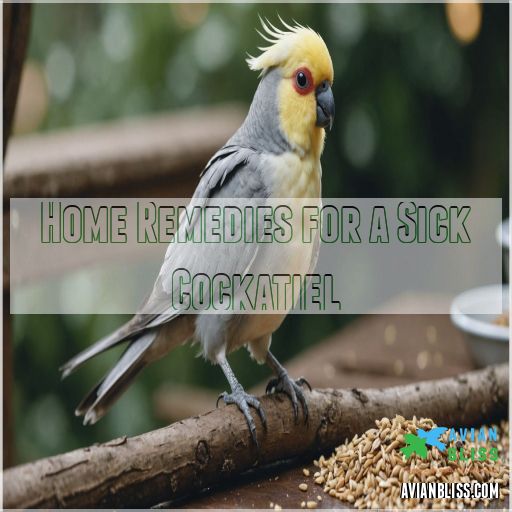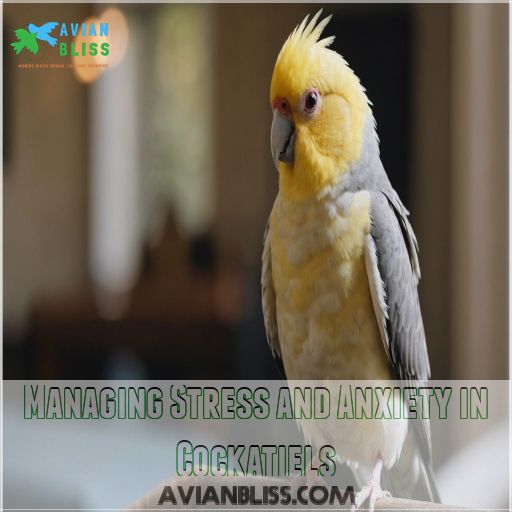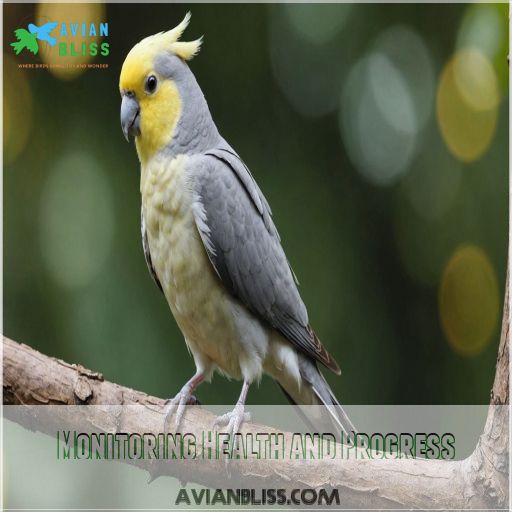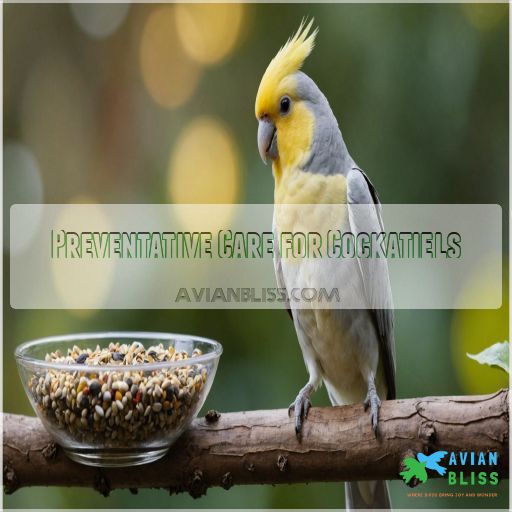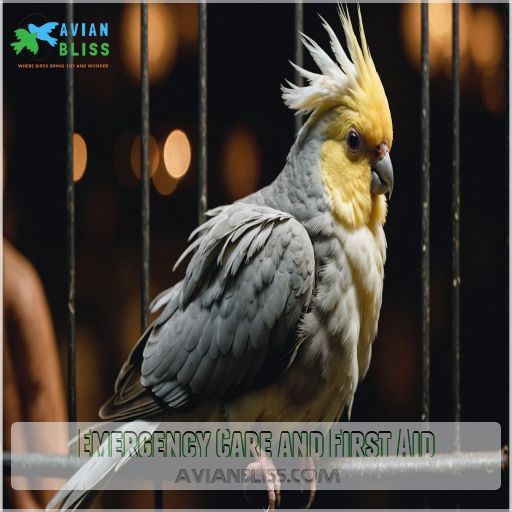This site is supported by our readers. We may earn a commission, at no cost to you, if you purchase through links.
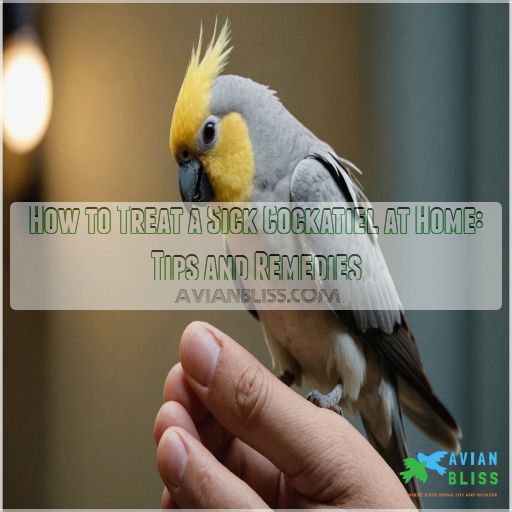
Keep their cage clean and well-ventilated, and offer plenty of fresh water and nutritious foods. Monitor their behavior closely, looking for changes in appetite, droppings, or energy levels.
A humidifier can help ease respiratory issues, while gentle baths can soothe and relax your bird. Remember, stress is the enemy of recovery, so minimize noise and distractions.
While home care is important, don’t play vet – some symptoms require professional help. With a little TLC, you’ll have your cockatiel singing again in no time.
But what about those tricky emergencies?
Table Of Contents
- Key Takeaways
- Recognizing a Sick Cockatiel
- Providing a Safe Environment for Recovery
- Home Remedies for a Sick Cockatiel
- Managing Stress and Anxiety in Cockatiels
- Monitoring Health and Progress
- Common Cockatiel Diseases and Treatment
- When to Seek Veterinary Care
- Natural Remedies for Sick Cockatiels
- Preventative Care for Cockatiels
- Emergency Care and First Aid
- Frequently Asked Questions (FAQs)
- Is my bird tired or sick?
- How long does it take for a sick bird to die?
- How do you know when a bird is dying?
- What home remedy is good for a sick bird?
- What does a sick cockatiel look like?
- How do you treat a bacterial infection in a cockatiel?
- How do you revive a cockatiel?
- Can a sick cockatiel recover without veterinary care?
- How long can a cockatiel survive without eating?
- Is vomiting always a serious symptom in cockatiels?
- What are signs of respiratory distress in cockatiels?
- How to safely administer medication to a sick cockatiel?
- Conclusion
Key Takeaways
- You are your bird’s first line of defense, so keep a sharp eye out for changes in behavior, appetite, and droppings. Think of yourself as a feathered detective – every clue counts when it comes to your cockatiel’s health!
- Create a cockatiel spa at home by providing a warm, quiet environment with proper humidity. It’s like giving your feathered friend a mini-vacation to help them bounce back to their chirpy self.
- Don’t play doctor – while home care is crucial, know when to call in the pros. If your cockatiel is acting more dramatic than a soap opera star, it’s time for a vet visit.
- Prevention is worth a pound of cure, not just millet! Keep your cockatiel’s diet balanced, their exercise regular, and their living space clean. It’s like giving them a tiny insurance policy against future health woes.
Recognizing a Sick Cockatiel
When your cockatiel starts acting like a moody teenager, it’s time to pay attention.
Watching for changes in behavior, sleep patterns, and appetite can help you catch a health issue before it becomes a full-blown drama.
Changes in Behavior and Sleep Patterns
Is your cockatiel suddenly pulling an all-nighter or snoozing during the day?
These changes in sleep patterns can signal illness. Watch for signs like nighttime restlessness, lethargy, or extra daytime naps—it’s akin to a teenager sleeping past noon!
Cockatiel symptoms like these call for close attention. Trust your instincts—your feathered friend’s health is in your hands, as these changes can be a sign of illness .
Decreased Activity Level and Loss of Appetite
When your cockatiel shows signs of decreased activity and loss of appetite, it might be as stressed as a deer in headlights.
Provide a calm environment by cleaning the cage regularly and minimizing noise.
Offer nutritious foods, and make sure fresh water is available.
If symptoms persist, a visit to an av is probably necessary to rule out diseases .
Changes in Tone of Voice and Droppings
Spotting changes in your cockatiel’s vocalizations and dropping consistency can be your bird’s way of saying something’s amiss. Watch out for:
- Hoarse voices—like a bird with a sore throat—hinting at infections or even avian medicine needs .
- Color changes or fecal frequency shifts—could point to lead poisoning .
- Immediate vet visits for bird health fears!
Providing a Safe Environment for Recovery
Creating a comfortable, stress-free environment is really important for your cockatiel’s recovery.
Maintain a clean, well-ventilated cage, and provide a quiet, cozy space where your feathered friend can rest and recuperate.
Maintaining a Clean and Well-Ventilated Cage
Keep your cockatiel’s cage as the cleanest spot in town. Use non-toxic disinfectant weekly, ensuring every perch and bar shines .
Ventilation is king, so avoid stuffy spots—birds love a breeze like we love pizza on Fridays.
Choose an ideal cage size and safe materials to keep your feathered friend comfy and thriving. Ensure a cage that provides VENTILATION.
Creating a Calm and Quiet Space for Rest
Creating tranquility for your ailing cockatiel is like setting the tone for a soothing symphony.
Make sure their rest is peaceful:
- Quiet area: No loud noises.
- Dimmed lights: Reduce brightness.
- Cage cover: Use at night for a cozy feel.
- Soft music: Play to calm nerves.
These help lower stress, aiding recovery .
Regulating Temperature and Humidity
You’ve created a calm, quiet space for your cockatiel, now let’s play climate controller. Adjust temperature and humidity to mimic a tropical spa.
Best settings are 78-80°F and 40-50% humidity, preventing dry beaks and feather frizz .
| Equipment | Purpose | Tip |
|---|---|---|
| Heat lamps | Maintain warmth | Keep away from perch |
| Cool air | Prevent overheating | Use fans judiciously |
| Humidifier | Boosts humidity | Prevents respiratory issues |
Home Remedies for a Sick Cockatiel
Caring for a sick cockatiel at home?
You can help your feathery friend by offering nutritious foods.
Creating a warm bath for relaxation can also be beneficial.
Using a humidifier to ease any respiratory issues is also a good idea.
Offering Nutritious Foods and Fresh Water
Ensuring your cockatiel eats well and stays hydrated can work wonders.
Offer diverse, high-energy foods to entice a picky eater:
- Soften pellets with warm water for easier digestion.
- Serve millet and warm veggies as comforting treats.
- Try feeding drops of water from your finger for a fun drinking game.
These steps encourage nourishment and hydration.
Creating a Warm Bath for Relaxation
As you treat your cockatiel, a warm bath can be very soothing.
Set the bath temperature lukewarm—not too hot. Let your bird enjoy this simple pleasure. Bath duration should be five minutes tops. Safety first: stay nearby to prevent any mishaps.
| Bath Aspect | Tip |
|---|---|
| Temperature | Lukewarm |
| Duration | 5 minutes |
| Frequency | Once a week |
| Safety | Always supervise |
A splash of bath benefits keeps your feathered friend chirpy.
Using a Humidifier to Ease Respiratory Issues
Turning on a humidifier can work wonders for your cockatiel’s stuffy nose and wheezy breathing.
Just be sure to use a cool-mist model and keep it clean to prevent bacteria buildup.
Aim for 50-60% humidity in their environment, and monitor your bird closely for any signs of improvement or distress.
A little extra moisture can go a long way in easing their respiratory woes. Turning on a humidifier can also help with their stuffy nose.
Managing Stress and Anxiety in Cockatiels
When your cockatiel’s stress levels soar, it’s time to channel your inner bird whisperer and create a soothing oasis.
By reducing noise and offering engaging toys, you’ll help calm their feathers while giving them an enjoyable distraction, helping to reduce their stress levels through an enjoyable distraction.
Minimizing Noise and Distractions
Create a serene haven for your cockatiel to reduce stress and promote its safety. Like us, birds need a quiet environment to relax and heal.
Try these tricks:
- Choose the Right Spot: Place the cage away from noisy areas and windows .
- Limit Loud Noises: Turn down the TV volume.
- Consistency is Key: Avoid frequent cage moves.
Providing a Variety of Toys and Activities
Keeping your cockatiel entertained, even when they’re under the weather, can make a world of difference.
Enrich their environment with a variety of toys and activities. Rotate toys frequently to prevent boredom.
Foraging toys and interactive play provide much-needed mental stimulation. Think of it as a little gym for the mind—your birdie will thank you for providing mental stimulation.
Offering Treats and Rewards for Good Behavior
To manage stress in your cockatiel, offering treats as positive reinforcement for good behavior can work wonders.
Treats should be small and nutritious:
- Use millet sparingly as a reward.
- Try different types of fruits and vegetables.
- Introduce seed-based treats for variety.
Always reward promptly to strengthen the behavior you’re shaping. It’s all about consistency and patience! .
Monitoring Health and Progress
When your cockatiel is feeling under the weather, keeping an eye on its health and progress is key to helping it recover.
Jot down any changes in behavior and appetite; this way, you’ll know if your feathered friend is pulling a sneaky "I’m fine" or actually getting better.
You’ll be able to monitor your cockatiel’s progress and notice any significant changes in its behavior and appetite.
When your cockatiel is feeling under the weather, keeping an eye on its health and progress is key to helping it recover.
Jot down any changes in behavior and appetite; this way, you’ll know if your feathered friend is pulling a sneaky "I’m fine" or actually getting better!
Keeping a Journal of Behavior and Appetite
Jotting down your cockatiel’s habits—like dropping changes, food preferences, or shifting sleep patterns—can be enlightening.
A table helps organize observations:
| Date | Food Preferences | Sleep Patterns | Activity Levels |
|---|---|---|---|
| Sept 1 | Seeds, not veggies | Normal | Low |
| Sept 2 | Fruits mostly | Restless | Normal |
| Sept 3 | Veggies ignored | Restless | High |
| Sept 4 | Ate seeds enthusiastically | Normal | Low |
Spotting patterns here helps make sure Louie’s perky peeps continue.
Tracking Changes in Droppings and Vocalization
Closely monitor your cockatiel’s droppings and vocalizations to spot any concerning changes.
Note the consistency, frequency, and color of the droppings, as well as the volume and tone of their calls.
Any deviations from their normal patterns could signal an underlying health issue that requires prompt veterinary attention.
Recognizing Signs of Improvement or Worsening
Shifting from tracking droppings and vocal changes to recognizing signs of improvement or worsening in your cockatiel can be as telling as knowing your favorite TV show’s plot twist.
Keep an eye on these four golden signs:
- Stable Dropping Consistency
- Increased Appetite
- Higher Energy Levels
- Improved Vocalization and Feather Condition
These are key indicators of health. (Source)
Common Cockatiel Diseases and Treatment
When your cockatiel starts wheezing like an old accordion, it might be facing respiratory diseases that require tender care.
Don’t let their nutritional or bacterial woes catch you off guard; a few simple dietary tweaks and timely antibiotic treatments can often help these feathery pals bounce back to their usual chirpy selves.
Respiratory Diseases and Treatment Options
When your cockatiel’s wheezing sounds as off-key as an out-of-tune ukulele, it could signal respiratory infections. Causes include fungal infections and air sac mites .
To provide relief and prevent further issues:
Keep their environment draft-free and regulated; consider nebulization therapy.
Home remedies like using a humidifier can help.
Remember, prevention’s worth a pound of millet: maintain a clean, stress-free habitat.
Bacterial Infections and Antibiotic Treatment
Just like avoiding a blunderbuss approach to respiratory issues, targeting bacterial infections requires the right antibiotics.
Be careful with antibiotic resistance, so only use medications like doxycycline under a vet’s guidance .
Follow precise dosage guidelines to sidestep side effects.
Safe administration is key; picture it as piloting a plane—you want smooth skies, not turbulence!
Nutritional Deficiencies and Dietary Changes
If your cockatiel’s looking peaky, check its diet for gaps. Signs like dull feathers or lethargy might scream "nutritional deficiency."
A diet shake-up could be the ticket to perky plumage. Mix in some colorful veggies and quality pellets, not just seeds.
You’ll want to sprinkle in vitamin A-rich foods, like carrots, but don’t overdo it—balance is key .
When to Seek Veterinary Care
When your cockatiel’s symptoms don’t improve or suddenly worsen, it’s time to think about a vet visit.
A sick bird can hide its illness so well, you’d think they’re auditioning for a role in a mystery novel!
Identifying Emergency Situations and Symptoms
Cockatiels can hide their illnesses well, so be vigilant for any changes in behavior or appearance.
Signs like labored breathing, lethargy, or bloody droppings require immediate vet attention.
Don’t delay – a sick bird’s condition can deteriorate rapidly.
Trust your instincts and get professional help if something seems off with your feathered friend.
Preparing for a Veterinary Visit
Ever wondered how to make a vet visit less stressful for your feathered friend?
Start by carefully preparing your bird’s carrier for safe transport. Gather any health records and jot down symptoms you’ve noticed.
Leave the toys at home, but bring along used cage paper for examination. Toss in a pinch of patience, and you’ll both breeze through the appointment! .
Following Veterinary Instructions and Advice
Before your vet appointment, make sure your cockatiel is comfortable.
Once instructions are in hand, don’t skip or adjust medication dosages. It’s like baking—stick to the recipe!
Give meds at the right time and resist the urge to play doctor.
Monitor changes and contact your vet for follow-up. Your feathered friend needs you to stay on point! .
Natural Remedies for Sick Cockatiels
Looking to help your feathered friend feel better without a trip to the vet?
Natural remedies can offer gentle support for your sick cockatiel, but it’s essential to use them wisely.
Knowing when professional care is needed is also crucial in ensuring the well-being of your pet.
Using Herbal Teas and Supplements
While veterinary care is super important, you can also explore natural remedies for your feathered friend.
Herbal teas and supplements can offer gentle support for your cockatiel’s health.
- Chamomile tea for relaxation
- Ginger tea for digestive issues
- Echinacea supplements for immune support
- Vitamin C-rich rosehip tea for overall health
Remember, a little
Providing Probiotics and Beneficial Bacteria
Just like herbal teas can soothe your cockatiel, probiotics can work wonders for their gut health.
These friendly bacteria help maintain a balanced digestive system, boosting your feathered friend’s immunity.
You’ll find specialized avian probiotics at pet stores, or you can offer small amounts of plain yogurt.
Remember, a happy tummy means a happier bird! Start with tiny doses and gradually increase, always keeping an eye out for any unusual reactions.
Exploring Alternative Therapies and Treatments
Beyond traditional treatments, you might consider exploring alternative therapies for your sick cockatiel. While these methods aren’t a substitute for veterinary care, they can complement conventional treatments.
- Herbal remedies like chamomile or echinacea
- Probiotic supplements for digestive health
- Homeopathic remedies specific to symptoms
- Gentle acupressure for stress relief
- Holistic care approaches focusing on overall well-being
Remember, your feathered friend’s health comes first, so always consult a professional before trying new treatments.
Preventative Care for Cockatiels
Taking care of your cockatiel before they get sick is like giving them a little insurance policy for their health and happiness.
By ensuring a balanced diet, regular exercise, and staying informed about common health issues, you can help your feathered friend avoid a trip to the vet.
And save them a squawk-filled car ride.
Maintaining a Balanced Diet and Nutrition
You’ve explored natural remedies, but let’s talk about the foundation of cockatiel health: a balanced diet.
Your feathered friend’s well-being hinges on proper nutrition.
Mix up their menu with a variety of seeds, pellets, and fresh fruits and veggies. Think of it as creating a colorful plate for your bird – the more diverse, the better!
Keep an eye out for any signs of nutritional deficiencies, like dull feathers or low energy, which can indicate a lack of balanced diet.
Providing Regular Exercise and Socialization
Now that you’ve got your cockatiel’s diet sorted, let’s talk about keeping them active and social.
Your feathered friend needs daily exercise and interaction to stay healthy.
Set up a "cockatiel playground" in their cage with various perches and toys . Don’t forget out-of-cage playtime too!
Spend quality time with your bird, but remember, they also benefit from having a companion of their own species , which can provide them with social interaction.
Staying Informed About Common Health Issues
While regular exercise keeps your feathered friend chirpy, staying informed about common health issues is equally important.
Keep your eyes peeled for the latest cockatiel care info. Bookmark reliable online resources, join bird-loving communities, and pick your vet’s brain during check-ups.
By staying in the loop, you’ll be better equipped to spot potential problems early on and keep your birdie singing a happy tune.
Emergency Care and First Aid
When your feathered friend faces an emergency, knowing how to provide quick and effective care can be a lifesaver.
This guide will equip you with essential first aid skills for your cockatiel, helping you handle accidents and injuries with confidence.
While recognizing when it’s time to rush to the vet.
This guide will be helping you with handling accidents and injuries with confidence while you do this.
Responding to Traumatic Injuries and Accidents
In the blink of an eye, your feathered friend can find themselves in a pickle. When accidents happen, staying calm is key. Remember, your cockatiel’s health is always top priority.
- Staying on the cage bottom
- Head tilt or circling
- Wing drooping or weakness
- Blood in mouth, ear, or eye
Providing Basic First Aid and Support
When accidents happen, quick action can be a lifesaver for your feathered friend. Here’s a handy guide to basic first aid for your cockatiel:
| Situation | First Aid | Don’ts |
|---|---|---|
| Bleeding nail | Walk bird in flour-filled shoebox | Don’t elevate blood pressure |
| Oil on feathers | Dust with flour in pillowcase | Avoid eyes, ears, nose |
| Minor burns | Flush with lukewarm water | Don’t apply ointments |
| Shock | Keep warm (30-32°C/86-90°F) | Avoid unnecessary handling |
Remember, these are just temporary measures. Your vet’s the real superhero in emergencies!
Knowing When to Seek Immediate Veterinary Care
You’ve got to know when your feathered friend needs a pro. Keep an eagle eye out for these red flags that scream "vet, now!":
- Severe bleeding or trauma
- Difficulty breathing or open-mouth breathing
- Sudden weakness, paralysis, or seizures
Don’t play chicken with your cockatiel’s health. If you’re on the fence about whether it’s an emergency, err on the side of caution and call your avian vet . Better safe than sorry!
Frequently Asked Questions (FAQs)
Is my bird tired or sick?
Telling the difference can be tricky. Look for signs like fluffed feathers, lethargy, or changes in eating habits.
A tired bird perks up after rest, while a sick one doesn’t improve.
When in doubt, consult a vet .
How long does it take for a sick bird to die?
The timeline for a sick bird’s decline varies greatly.
It can range from hours to weeks, depending on the illness and care provided.
Quick action is essential – consult an avian vet immediately if you notice any concerning symptoms.
How do you know when a bird is dying?
When a feathered friend’s time is near, you’ll notice telltale signs.
Look for dull, unfocused eyes, fluffed feathers, and difficulty breathing.
They may stop eating, become less active, and have discharge from eyes or nostrils .
What home remedy is good for a sick bird?
You can keep your sick bird warm, offer electrolyte-enriched water, and provide a quiet, stress-free environment.
Add avian vitamins can be added to their water and make sure they’re eating.
However, it’s really important to consult a vet for proper diagnosis and treatment (Source).
What does a sick cockatiel look like?
A sick bird might look drowsy, fluff its feathers, and sit low on the perch.
Don’t assume a fluffed-up cockatiel’s just chilly!
Watch for changes in appetite, droppings, or breathing.
Eyes may appear dull or sunken (Source).
How do you treat a bacterial infection in a cockatiel?
Treating a cockatiel’s bacterial infection requires veterinary care.
At home, isolate your bird, disinfect its cage, and follow your vet’s instructions closely.
Antibiotics like doxycycline are often prescribed for 45 days . Never attempt treatment without professional guidance.
How do you revive a cockatiel?
70% of cockatiels respond well to gentle care at home.
To revive a cockatiel, create a warm, quiet environment. Offer water with electrolytes and soft foods.
Monitor breathing and keep stress low. For serious symptoms, consult an avian vet immediately.
Can a sick cockatiel recover without veterinary care?
While it’s possible for a cockatiel to recover from minor illnesses at home, it’s risky. You’re better off consulting a vet.
Proper care, warmth, and nutrition can help, but professional guidance is essential for your feathered friend’s well-being .
How long can a cockatiel survive without eating?
Your cockatiel can survive without food for about 48 hours, but it’s really important to act sooner.
After 18-24 hours without eating, your feathered friend’s health could be at risk.
Don’t wait – address eating issues promptly!
Is vomiting always a serious symptom in cockatiels?
In a world of feathered drama, vomiting in cockatiels isn’t always a five-alarm emergency.
It can signal various issues, from minor to serious.
Keep a close eye on your bird’s behavior and consult a vet if it persists.
What are signs of respiratory distress in cockatiels?
Keep an eye out for tail bobbing, open-mouth breathing, coughing, and lethargy in your cockatiel. These can signal respiratory distress .
Don’t ignore sneezing or nasal discharge either – they’re red flags for potential breathing issues .
How to safely administer medication to a sick cockatiel?
Gentle as a feather, administer medication to your cockatiel with care.
Wrap them snugly in a towel, leaving the head free. Use a dropper or syringe, slowly delivering the dose into the side of their beak .
Talk soothingly throughout.
Conclusion
While treating a sick cockatiel at home can seem scary, you’re now equipped with valuable knowledge to help your feathered friend.
Remember, patience and consistency are key. Observe your bird closely, provide a stress-free environment.
Don’t hesitate to consult a vet if symptoms worsen. With your loving care and these tips on how to treat a sick cockatiel at home, you’ll be well-prepared to nurse your pet back to health.
Soon enough, you’ll hear those cheerful chirps again!

